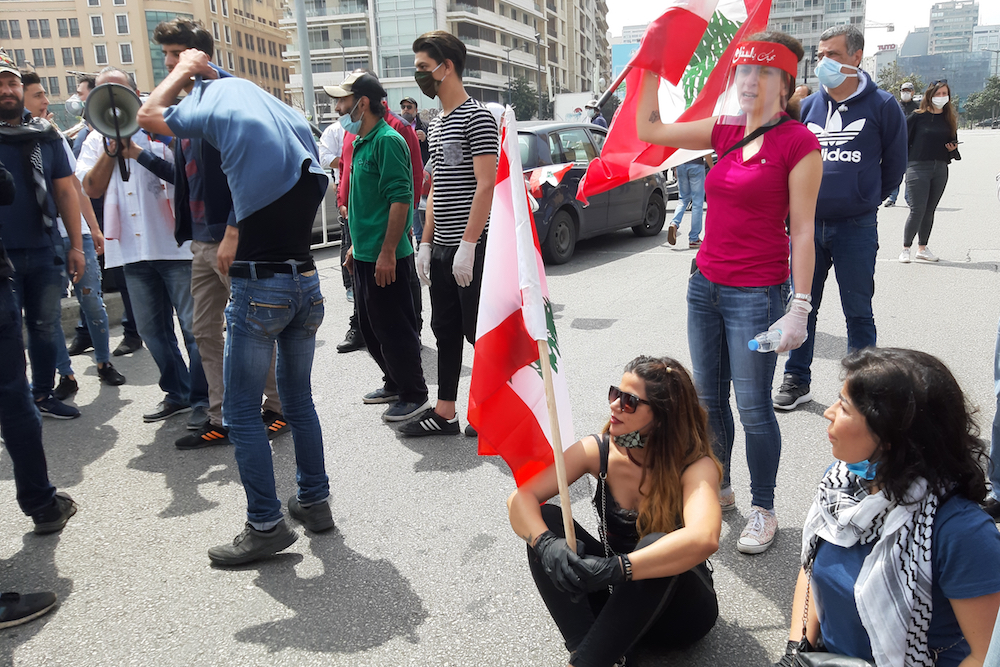
Covid-19 brought quiet to Beirut—but only briefly. Before long, protesters returned to the streets. Photo by Abby Sewell.
The eeriest thing about Beirut’s streets during the first weeks of the quarantine—the lull between two storms, before the protesters returned to the streets and started throwing Molotov cocktails at the banks—was the absence of taxi horns.
Those horns, and the relentless sensory assault they constitute, are among the features that define my experience of this city that has somehow become home. As a Beirut resident for three years before the quarantine, I found that every time I returned to the Lebanese capital after a visit elsewhere it would take me a few days to readjust to the onslaught of noise you experience as you walk down the street.
The taxis, an ad-hoc cavalry of battered ’80s-era Mercedes, normally slow to a crawl and honk insistently every time a driver spots someone on the sidewalk, regarding every pedestrian as a potential fare. I would consider this sort of behavior to be the precursor to a sexual harassment incident in a U.S. city—so when I was new to Beirut, I would tense up. Eventually the honking became nonthreatening background noise, to be dismissed with a head tilt and click of the tongue.
The taxis did not disappear from the streets after the quarantine order, but their numbers thinned—especially after the government limited the days that cars can be on the road based on their license numbers. Before the coronavirus, Beirut was not a place where traffic regulations—or most regulations—meant much, but fear of the virus briefly amended the social contract. In those first weeks of the lockdown, the taxi drivers, like the rest of the city, appeared dazed and subdued. The streets were strangely silent, but not entirely: for the first time, I could hear the chirping of birds.
Before coronavirus, Beirut was many things, but it was never subdued. There was a constant nervous energy, an electric current that you always felt was ready to blow—and sometimes did.
The most dramatic outburst during my tenure in the city came on October 17, 2019. Pent-up frustration—over the country’s deteriorating economic situation, its electricity shortages, its decades of corruption, and its sectarian political parties that had competed for their pieces of the pie since the end of the civil war, until the pie was gone—came to a head when the government proposed new taxes. These new levies included the now-infamous “WhatsApp tax” on internet-based calling services, which most Lebanese rely on for communications because regular phone calls and texts are prohibitively expensive.
At 7 p.m. that October evening, I finished my shift at the downtown office of the local English-language newspaper where I was still working at the time, even though the publication was two months behind on paying our salaries. On my way home, I passed by a small group of protesters in Riad al Solh Square, where they were outnumbered by the line of riot police guarding the nearby Parliament building and the seat of the Prime Minister. The protesters weren’t chanting. They were simply standing, and waiting.
I stopped to interview a couple of the protesters and continued on my way. I had an appointment to meet the man who I was going to fall in love with, a Palestinian journalist. We had met before as friends; this would be our first official date. We sat in a café in Manara, next to the sea, and drank tea, oblivious to what was going on elsewhere.
Later, we walked up toward Hamra and stopped into Abou Elie’s, a smoky hole-in-the-wall known as “the communist bar,” to have a glass of arak. We were the only ones at Abou Elie’s that night, which was strange. The bartender told us that the protests had swelled over the past couple of hours. The bar’s usual patrons had left to join the beginning of what would be dubbed the October Revolution.
As the numbers in the streets grew, the protest turned into a night of rage. Protesters smashed storefront windows in the pristine downtown district, normally considered out of reach to all but a wealthy few, and blocked roads with burning tires and overturned dumpsters. Watching the pandemonium unfold via Twitter and WhatsApp messages, my friend and I asked each other if we should go down to document it. Perhaps we are bad journalists, but at the time it seemed more important to drink arak and talk until midnight. By the time we left Abou Elie’s the streets were empty, lit by the remaining embers of torched tires and construction debris.
The next morning, and for the months before COVID-19 made “social distancing” a popular phrase, it felt like all of humanity was cramming into the squares. There was anger, but also joy. It was as if everyone in this often-fragmented society had been waiting for a reason to be squashed together by the hundreds and thousands, shouting, singing, and holding discussions that went on for hours.
By the time the first coronavirus case surfaced in Lebanon in late February, the numbers in the streets had dwindled, and divisions had emerged in what had at first been a unified cry for change. The lira’s value had plummeted, and the economic desperation in the country grew. The protests, while smaller, had become increasingly aggressive; the security forces’ response grew more violent. Even before the pandemic’s arrival, hospitals struggled to get medical supplies, which had to be imported using dollars that had become scarce and expensive.
When the government announced a countrywide lockdown beginning March 15, no one debated about it harming the economy, because the economy had already collapsed. Everyone seemed to agree that the country could not bear a public health crisis. When the quarantine order came, there was a sense of resignation and, perhaps, relief. After months of anti-government demonstrations in the central squares, people retreated to their neighborhoods and family villages.
I had been planning to travel to the U.S. in early April, and then to the wedding of close friends in Oaxaca, Mexico. But the wedding was postponed, and the Beirut airport was closed anyway. I could have gotten on an American embassy-chartered flight to Dallas or Miami for $2,500, but I wasn’t interested. After tweeting about this decision to stay put, I made an appearance in a CNN story about Americans refusing repatriation because they felt safer in Lebanon, which briefly turned me into a minor local celebrity. At the time, I was flippant about my lack of desire to return to the States, but as the weeks went on, I began to wonder when, actually, it would be safe to go back, and what my country would look like when I did. I watched from a distance as the number of U.S. deaths shot up and reports surfaced of shortages in masks, gloves, and ventilators, and of people hoarding toilet paper and lining up to buy guns.

A view of the Corniche, Beirut, Lebanon. Photo by Abby Sewell.
Before the virus, when Lebanese people learned that I was American, they used to ask, “Why would you come here? Everyone here wants to go to America.” Now, when people hear that I’m from the U.S., they ask if my parents are safe. (They’re fine; thank God).
In my neighborhood in Beirut, economic crisis notwithstanding, the pharmacy never ran out of masks and the stores never ran out food, or even toilet paper. Thanks to the majority Muslim population in my part of the city, toilet paper was never going to be a major concern, since most bathrooms are equipped with a shatafa, a handheld bidet sprayer. The gun stores I’ve passed since the beginning of the quarantine have all closed, and no one was complaining about it (although I’m sure that anyone who really wanted a firearm could still get one). The hospitals didn’t run out of ventilators or ICU beds, and, somehow, the number of COVID-19 cases—and COVID-19 deaths—crept up only gradually. Reported deaths have reached 26 as I write this.
“We don’t really know why, but the situation is under control,” a friend who works at the American University of Beirut Medical Center told me.
It has been a relief that one thing has remained under control. As the quarantine reached its second month, the lira continued its freefall. From the official rate of 1,507 lira to the dollar, it reached 4,000 to the dollar on the black market. Prices for goods doubled and tripled; those who were still getting a salary lost more than half of its value. People with money in the banks couldn’t get it out. People without money slid into destitution. While the streets remained largely empty, the increasing number of beggars was striking. With no significant safety net to offset the forced unemployment, people despaired, and regulations became insignificant once again. And perhaps the enforced isolation, which runs totally counter to Lebanese culture, had become too much to bear on top of everything else.
On April 24, the first day of Ramadan, I visited Tripoli—a notoriously disenfranchised working-class city on the northern coast dubbed the “bride of the revolution” for its massive protests since October—for a reporting trip. The souks were bustling. In one sweets shop, a fight nearly broke out between men jostling for their place in line. Economic anxiety far trumped fears of the virus. “We’re not afraid of the corona. We’re afraid of becoming Venezuela,” one shop owner told me.
In Beirut, even before the government officially began to relax restrictions at the end of April, municipal police officers had largely stopped shooing stray pedestrians off the Corniche, the seaside walkway that used to be full of families, joggers, vendors, and fishermen. Army trucks were no longer stopping cars out driving after curfew. In the Mar Elias Palestinian camp, volunteers still stand guard at the entrance to take the temperatures of entering residents and visitors, but after iftar, people come down to the street and sit in a circle, drinking coffee and smoking cigarettes.
And the protesters returned to the streets, with much of their anger now focused on the banks. Some wore masks, but social distancing quickly went out the window. On one of the first nights of renewed protests, in front of the Central Bank in Hamra, I watched uneasily from the edge of the crowd as a group of young men chanted, “We don’t care about corona! Riad Salameh is corona!” They were referring to the embattled Central Bank chief. Security forces futilely threatened them with tickets, for violating the 8 p.m. curfew order.
In the days that followed, demonstrators began to lob Molotov cocktails at bank offices. In Tripoli, a young demonstrator was killed in a clash with the Army. In a particularly poignant video widely shared on social media, as police scuffled with a group of protesters blocking the highway in the Beirut suburb of Jal el Dib, a protester shouted into an officer’s face, “I’m hungry!”
“I’m hungrier than you!” the officer shouted back.
Today, the number of taxis on the street is still smaller than before the virus hit, but they have resumed honking. The last time I stopped a cab was during the first few days of the quarantine, to interview the driver for a story about workers who couldn’t afford to stop during the lockdown. He told me that the cost of gas was often more than the fares he collected from the few riders he picked up. But he kept it up because he didn’t have another option.
I felt guilty for stopping him, taking his time, and potentially putting him at risk—even though I was talking to him from outside the passenger side window and wearing a mask (he wasn’t). When we finished the interview, I tried to give him the equivalent of a fare, but he wouldn’t take it.




Send A Letter To the Editors